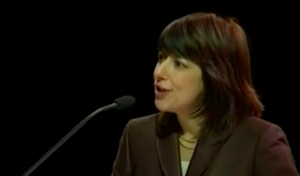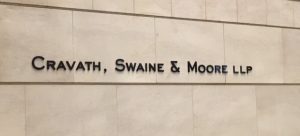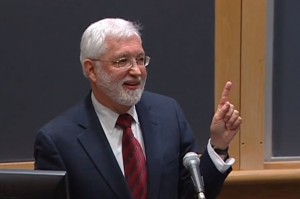Tag: Ed Whelan
-
 Non-Sequiturs
Non-SequitursNon Sequiturs: 04.21.19
* What’s the future of Elizabeth Prelogar, the beauty queen turned Harvard Law School grad turned Supreme Court clerk turned Team Mueller member? Not clear, except that it’s blindingly bright. [Ozy]
* How often do you see this? A federal judge praises counsel — specifically, J. Christian Adams of the Election Law Center, Douglas R. Cox of Gibson Dunn, Michael E. Rosman of the Center for Individual Rights, and local counsel Mun Su Park — for their “conscientious billing practices.” [Volokh Conspiracy / Reason]
* Another Lawyerly Lair of Jonathan Schiller, of Boies Schiller Flexner fame: a stunning modern retreat on Martha’s Vineyard, designed by his son, architect Aaron Schiller (whose firm also did the new BSF offices in Hudson Yards). [Martha’s Vineyard]
* Amicus brief of the month: a compelling — and, sadly, entertaining (see the Appendix) — analysis of the U.S. Patent and Trademark Office’s utterly incoherent approach to supposedly “immoral or scandalous” trademarks, filed by William Jay and Goodwin Procter on behalf of law professors Barton Beebe and Jeanne Fromer. [Supreme Court of the United States]
* Here’s a clear and concise explanation of the “Rule of 80,” taking “senior status” as a federal judge, and what this all means for the ideological balance of the judiciary, courtesy of Ed Whelan. [Bench Memos / National Review]
* How should we think about President Donald Trump’s branding of the press as “the enemy of the people”? Negatively, to be sure — but let’s also keep in mind that the media is not a monolith, as First Amendment lawyer Charles Glasser helpfully reminds us. [Daily Caller]
* Stephen Cooper survived a stabbing — then went on to defend violent criminals for many years as a federal public defender. [Alabama Political Reporter]
* Cooper argues that we need to be less punitive and more thoughtful in our treatment of offenders — and Joel Cohen seems to agree, defending an unusual but wise sentence recently handed down by Judge Valerie Caproni (S.D.N.Y.). [New York Law Journal]
-
 Non-Sequiturs
Non-SequitursNon Sequiturs: 02.03.19
* How have personnel changes at the Supreme Court affected the dynamics at oral argument? Adam Feldman offers this analysis. [Empirical SCOTUS]
* Ed Whelan expresses relief over the White House’s new slate of Ninth Circuit nominations. [Bench Memos / National Review]
* Can President Trump declare a “national emergency” in order to build his beloved wall? The National Emergencies Act is not a blank check, according to Brianne Gorod. [Take Care]
* Should Congress pass a “deepfakes” law? Orin Kerr has some concerns. [Volokh Conspiracy / Reason]
* What’s going on with Rudy Giuliani? Joel Cohen has a theory. [The Hill]
* Jean O’Grady is pleased to see all the competition in the legal analytics space (with Precedent Analytics from Thomson Reuters as the newest entrant) — but she’d like to see more support for the competing claims of the different products. [Dewey B Strategic]
* News organizations need stricter and better guidelines when interviewing mentally ill defendants, according to former public defender Stephen Cooper. [The Tennessean]
* Have questions about the fast-approaching February bar exam? Ashley Heidemann has answers. [JD Advising]
 Sponsored
SponsoredTrust The Process: How To Build And Manage Workflows In Law Firms
If you’re feeling inefficient but don’t know why, this episode of the Non-Eventcast is for you.-
 Non-Sequiturs
Non-SequitursNon Sequiturs: 01.13.19
* A happy 200th birthday to Cravath, which celebrates its bicentennial in 2019 (and which has launched a sharp-looking, historically rich microsite for the occasion). [Cravath/200]
* According to Dayvon Love, “the policy response from mainstream political institutions and the Democratic Leadership in Maryland to the issue of gun violence and homicide in the Black community is mired in racism.” [Leaders of a Beautiful Struggle]
* The current Term of the Supreme Court doesn’t boast many blockbusters — but some cases are more interesting than others, as Adam Feldman points out. [Empirical SCOTUS]
* Illegal aliens, guns, and strict liability, oh my! Eugene Volokh breaks down Rehaif v. United States, which SCOTUS just agreed to hear. [Volokh Conspiracy / Reason]
* The Supreme Court has taken an increased interest in intellectual property in recent years — and if it wants to tackle issues of copyright infringement in the digital age, Capitol Records v. ReDigi could be a good vehicle. [All Rights Reserved]
* Speaking of supreme courts, Florida’s is likely to shift rightward, as Ed Whelan explains. [Bench Memos / National Review]
* If you’re getting lots of questions from friends and family about the constitutional law of shutdowns, check out this helpful explainer from Zachary Price. [Take Care]
* And if you have thoughts on what legal publishers got right and wrong in 2018, Jean O’Grady would like to hear from you. [Dewey B Strategic]
-
 Non-Sequiturs
Non-SequitursNon Sequiturs: 12.02.18
* What are expert advocates’ secrets to cert success? Adam Feldman’s very interesting analysis suggests that using certain buzzwords in a petition might help. [Empirical SCOTUS]
* Ilya Somin points out this
fundepressing fact: one of the plants that General Motors will be closing sits on land seized in a controversial taking that forcibly displaced more than 4,000 people. [Reason / Volokh Conspiracy]* The Third Circuit is poised to become the first (but probably not the last) circuit court to “flip” flip from a majority of Democratic appointees at the outset of the Trump administration to a majority of Republican appointees, as Ed Whelan notes. [National Review / Bench Memos]
* A June 3 trial date has been set for Sigfredo Garcia and Katherine Magbanua in the Dan Markel case — almost five long years after Professor Markel’s murder. [Tallahassee Democrat]
* In the wake of a recent tragedy, Neha Sampat offers some reflections on impostor syndrome in the legal profession. [ABA Journal]
* If you’re a conservative or libertarian law student, you should consider attending the Federalist Society’s 2019 National Student Symposium, with “The Resurgence of Economic Liberty” as its theme. [Federalist Society]
* Can the Supreme Court save our democracy? David Pozen opines (and he’s not optimistic).
-
 Non-Sequiturs
Non-SequitursNon Sequiturs: 11.11.18
* The unstoppable Justice Ruth Bader Ginsburg maintains her three-Term streak as author of the Supreme Court’s first signed majority opinion — and, interestingly enough, it’s a unanimous affirmance of the Ninth Circuit (opinion by my former boss, Judge Diarmuid O’Scannlain). [Empirical SCOTUS]
* When he’s not busy issuing landmark decisions (and feeding his clerks to SCOTUS), Judge Jed Rakoff (S.D.N.Y.) writes erudite essays for the New York Review of Books — like his latest, a review of Joel Richard Paul’s new biography of Chief Justice John Marshall (affiliate link). [New York Review of Books]
* President Donald Trump is transforming the federal judiciary with his youthful and conservative appointments — but the extent of the transformation should not be exaggerated, for reasons identified by Ed Whelan. [Bench Memos / National Review]
* Ann Althouse analyzes some of the juiciest passages in Michelle Obama’s new memoir (affiliate link). [Althouse]
* It has been a long time — specifically, more than four years — since the Department of Justice has issued an opinion about the Foreign Corrupt Practices Act, as FCPA guru Mike Koehler points out. [FCPA Professor]
* Peter Schuck responds, in thoughtful and civil fashion, to the (many) critics of his and Rogers Smith’s argument that the Fourteenth Amendment does not require birthright citizenship for the children of unlawfully present aliens. [PrawfsBlawg]
* After last Tuesday’s elections, in which Louisiana approved a state constitutional amendment requiring a unanimous jury to convict in a criminal case, Oregon is the only state that allows conviction in some criminal cases without a unanimous jury — and Gerard Magliocca wonders if this is constitutional. [Concurring Opinions]
* He’s no stranger to our pages, but Isaac Lidsky — the child actor (Saved By The Bell) turned first blind SCOTUS clerk turned successful entrepreneur — still has many insights to share, as he does in this wide-ranging podcast with Goli Kalkhoran. [Lessons From A Quitter]
-